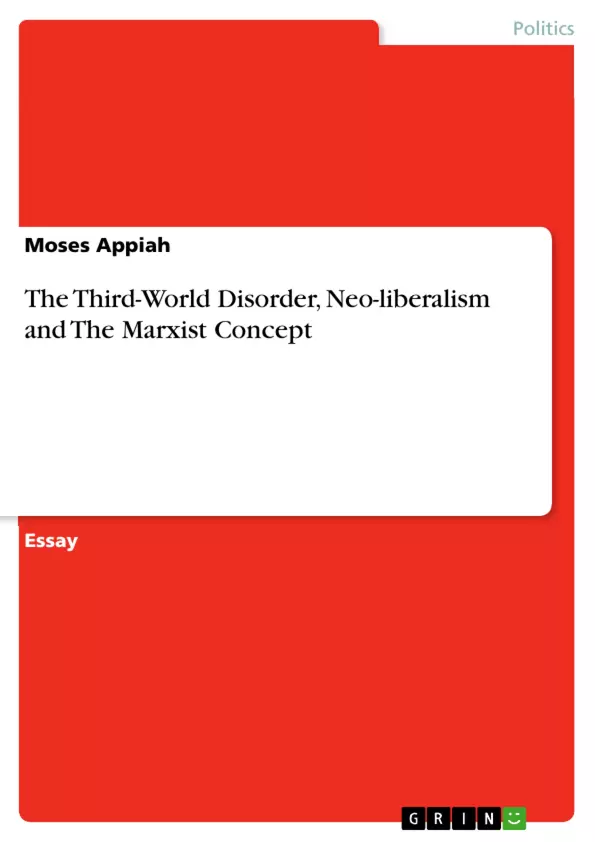The “realpolitik” of power and self-interest from a realist perspective would mean that the absence of a global form of governance would position mankind and contemporary transitions in a state of anarchy. The centrality of this paper is to mainly point out rather, certain disparities that have plagued the global economic system. The perspectives are varied, but the concerns raised by liberalized geopolitical relations (that is to make reference to structural realist conceptions that hold the view that such anarchies are necessary for “power struggle”) as against early Marxist and Neo-Marxist critical perspectives are of immense value for this paper. The condition of today’s global economy is perhaps directly or indirectly structured in negligence of the plights of the most deprived regions of the world. Taking a cue from Cox to enhance such conceptions, we first of all deal with hierarchies of social forces, states, and global governance to understand hegemony and ‘identify counter-hegemonic movement’.
Inhaltsverzeichnis (Table of Contents)
- The Third-World Disorder, Neo-liberalism and The Marxist's Conception.
- Introduction
- Realism and International Politics
- Liberalism and Global Economy
- Liberalism and Global Governance Structures
- Democracy and its Limitations
- Trade and Economic Liberalisation
- Neo-liberalism and its Critics
- Marxist Critique of Capitalism
Zielsetzung und Themenschwerpunkte (Objectives and Key Themes)
This paper aims to analyze the impact of neo-liberalism on the global economy and its consequences for the Third World. It examines the disparities and inequalities produced by liberalized geopolitical relations, particularly focusing on the exploitation and dependency of the global South. The paper draws on Marxist theory to critique the capitalist system and its impact on social classes and power structures.
- The impact of neo-liberalism on the global economy
- Disparities and inequalities between the global North and South
- The role of power structures and hegemony in shaping global order
- Marxist critique of capitalism and its implications for the Third World
- Counter-hegemonic movements and visions for a more equitable world order
Zusammenfassung der Kapitel (Chapter Summaries)
- The paper begins by outlining the concept of realism in international politics, highlighting the struggle for power as a central theme. It emphasizes the power dynamics within states and between global governance structures, and introduces the concept of hegemony.
- The paper then shifts to an analysis of liberalism and its transformative influence on the global economy through capitalist structures. It explores the impact of economic liberalization on the growth of industries, market competition, and societal transformations.
- The paper delves into the role of democracy in liberalized governance structures, discussing its limitations and the potential for power to be concentrated in the hands of a few. It examines the relationship between economic development and democracy, highlighting the correlation between stable democracy and economic growth.
- The paper further explores the rise of neo-liberalism and its influence on the global market. It analyzes the criticisms directed at neo-liberalism and capitalism for exacerbating inequalities and perpetuating class divisions.
- The paper concludes by presenting a Marxist critique of capitalism, emphasizing its exploitative nature and its creation of social classes based on ownership of the means of production.
Schlüsselwörter (Keywords)
The paper focuses on key concepts such as capitalism, socialism, liberalism, the Third World, global order, exploitation, dependency, affluence, deprivation, economic growth, industrialization, hegemony, and counter-hegemony. It explores the interrelations between these concepts and their influence on the global political and economic landscape.
Frequently Asked Questions
What is the central theme of "The Third-World Disorder"?
The paper examines the disparities in the global economic system, specifically how neo-liberalism and liberalized geopolitical relations impact deprived regions of the world.
How does the paper view realism in international politics?
From a realist perspective, the absence of global governance leads to a state of anarchy where power struggle and self-interest dominate international relations.
What is the Marxist critique of global capitalism presented here?
The paper uses Marxist theory to critique the exploitative nature of capitalism, which creates social classes based on ownership and perpetuates dependency in the Global South.
What is meant by "hegemony" in this context?
Hegemony refers to the dominance of certain social forces and states within global governance structures that shape the economic order to their advantage.
What are "counter-hegemonic movements"?
These are movements and visions that challenge the existing power structures and seek to create a more equitable and just global world order.
How does economic liberalization relate to democracy?
The paper explores the correlation between stable democracy and economic growth, while also discussing the limitations of democracy in liberalized governance structures.
- Quote paper
- Moses Appiah (Author), 2018, The Third-World Disorder, Neo-liberalism and The Marxist Concept, Munich, GRIN Verlag, https://www.grin.com/document/1269864



